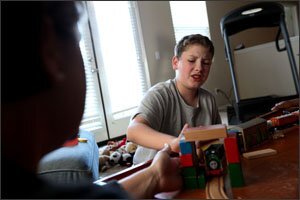A proposed $5 million voucher program for military families who have children with special education needs is part of the defense-spending bill that Congress will take up in its post-election lame-duck session.
The pilot program would start in the 2011-12 school year and provide up to $7,500 per year for school costs. The U.S. Department of Defense would be required to evaluate the success of the program in a report to be completed no later than 2015.
The pilot program is only one of several provisions tucked into the $726 billion defense bill that are intended to improve schooling for military children who require special education services. The proposed amendment, which was sponsored by Sen. Lindsey Graham, R-S.C., would also direct the secretaries of defense and education to collaborate on issues such as expedited due process resolution for military families and creation of individualized education programs that are applicable across state lines.
Some of these issues, like “portable” IEPs, are already a part of the current Individuals with Disabilities Education Act. Likewise, a commission of state officials two years ago created the Interstate Compact on Educational Opportunity for Military Children, which has a section specific to special education and has been enacted by 34 states so far.
About 100,000 active-duty and reserve service members have dependents with special needs, including spouses, children, and dependent parents. But military families say the current regulations don’t work well for parents and children who are constantly on the move. Families are told that certain services that they were used to in one district can’t be implemented in another, according to supporters of the amendment. And due process hearings often aren’t resolved before the family is transferred to another duty station.
Different Supports
That was the experience of Sheri Dyas Mellott, whose husband is a commander in the U.S. Navy. She has a 14-year-old and a 6-year-old who have autism spectrum disorders, and an 11-year-old with an eye disorder. The children have attended nine different school districts in five different states, she said.
During one battle, which took place while the family was stationed at Naval Air Station Lemoore, in central California, the Mellotts paid $80,000 to bring in specialists to observe their oldest child and to advocate on his behalf during due process hearings. “We had no help from the military,” Ms. Mellott said. “We were completely on our own.”
Eventually, her husband left the Navy and the family settled in State College, Pa., so that their children could receive adequate special education services, she said.
“If we had a fight [as an officer’s family], can you imagine what the young enlisted guys have to go through?” she said. Karen Driscoll, who has a 12-year-old son with autism, experienced a similar dispute when the family moved to San Diego, Calif., in 2008. When her son was enrolled in Fairfax County, Va. schools, he was receiving 21 hours of aide support a week. In California, the district told her that it would provide 10 hours a week.

Unlike Ms. Dyas, Ms. Driscoll had the support of a caseworker and a special education attorney who is contracted through the U.S. Marine Corps to provide support to families. Ms. Driscoll, the wife of a Marine Corps colonel, and other parents have lobbied Congress and military officials to provide more support to families. In her case, once the attorneys got involved, her son got the full-time aide and other services comparable to what he had received at his other school.
Ms. Driscoll said she favors vouchers because they offer familes an option. The voucher amount of $7,500 “is inadequate, but it makes a difference.”
Costly Services
All military service members who have family members with special needs are required to enroll in the Exceptional Family Member Program, which is intended to make sure members of the military who have dependents with special needs are not sent to postings where their needs cannot be met.
However, the family support function that is part of the program is voluntary, and services available to families can vary depending on the service branch.
The idea of a voucher for military families has been met with stiff resistance from some education groups.
Mary Kusler, the manager of federal advocacy for the Washington-based National Education Association, the nation’s largest teachers union said the federal government has underfunded special education for years and parents who accept such vouchers would be walking away from guaranteed rights under the IDEA.
Richard Schulte, the superintendent of the 5,500-student Oak Harbor district in Washington state, also opposes the voucher, though he said he recognizes that families may be receiving different levels of services as they move. In his district, about 3,600 students are military dependents from families based nearby at Naval Air Station Whidbey Island.
A voucher worth $7,500 is not going to pay for a program to support the needs of a child with intensive educational needs, he said. For example, a student with autism may cost the district $10,000 to $50,000 to educate, he said. “There aren’t other providers for them to go to,” he said.





